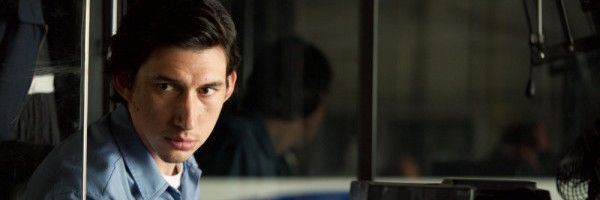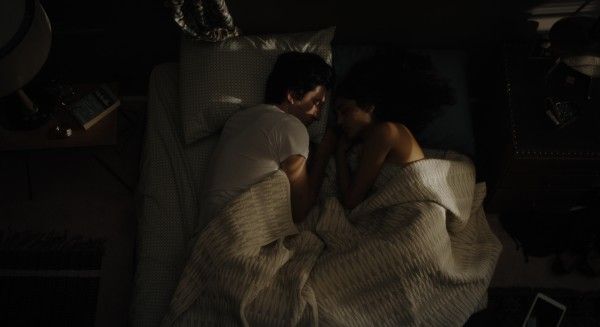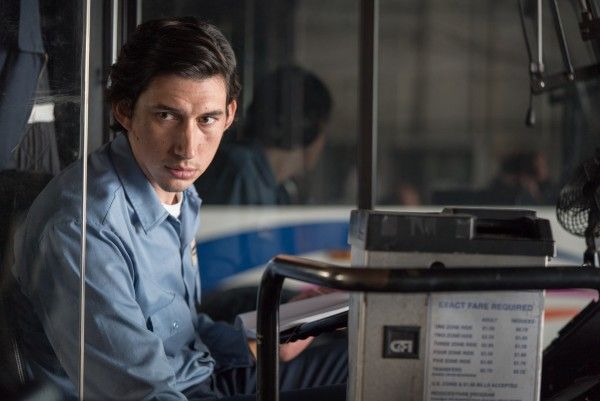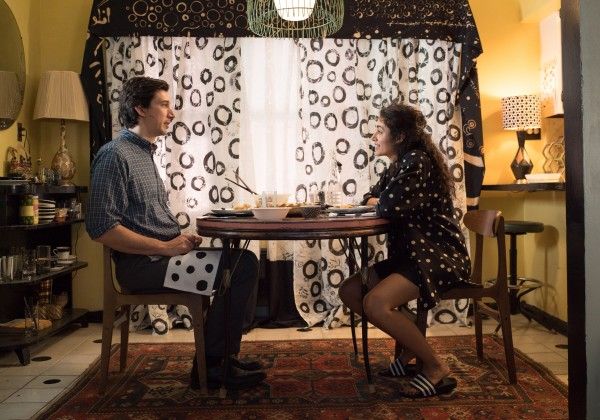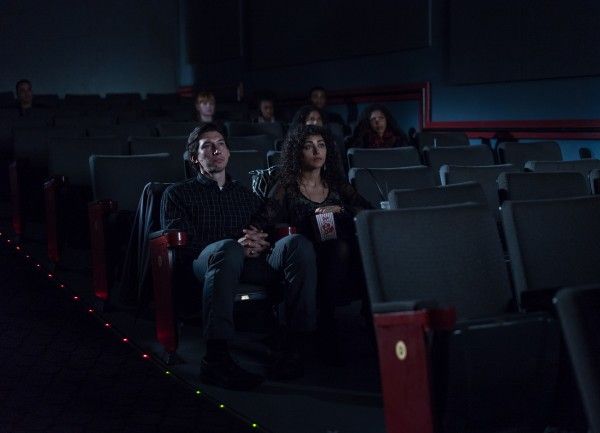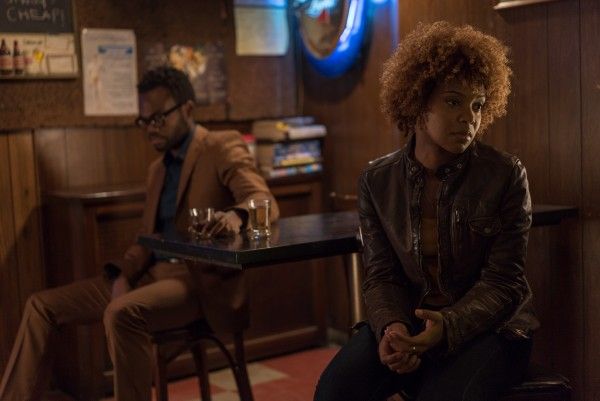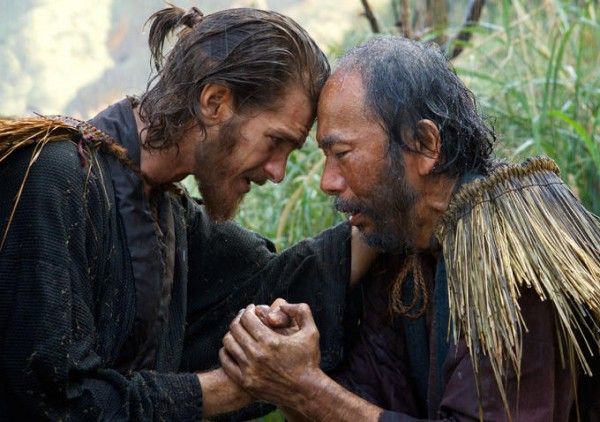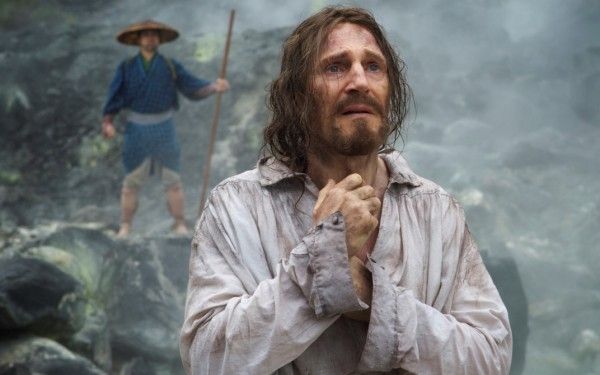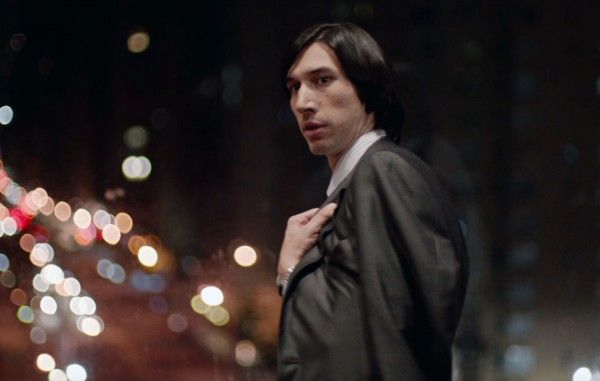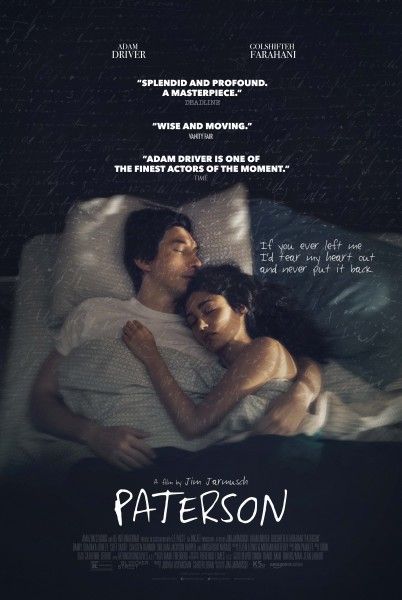One of the many films to play at this year’s Toronto International Film Festival was writer-director Jim Jarmusch’s drama Paterson, which world premiered earlier this year at Cannes to glowing reviews. In the quiet film, Adam Driver plays a bus driver named Paterson who was named after his birthplace, Paterson, New Jersey, where he still lives. Over the course of seven days we follow Paterson as he adheres to his simple routines which include writing poetry, walking his dog, drinking at his local pub, and being there for his wife Laura (played by Goldshifteh Farahani). In contrast to Paterson, Laura is a free spirit whose world is ever changing.
Unlike most movies where some outside force would cause friction in their relationship, the film follows Paterson and Laura through the triumphs and defeats of daily life while still showing a couple that loves and cares for one another. In the press notes, Jarmusch says he wanted Paterson to be “a celebration of the poetry of details, variations and daily interactions and a kind of antidote to dark, heavily dramatic or action-oriented cinema. It’s a film one should just allow to float past them—like images seen from the window of a public bus, moving like a mechanical gondola through a small, forgotten city.” I think he absolutely accomplished what he set out to do and when Amazon Studios and Bleecker Street release the film later this year (December 28), I suggest checking it out.
Shortly after seeing the film I landed an exclusive interview with Adam Driver. During our wide-ranging conversation he talked about his love of Jim Jarmusch, the experience of making Paterson, how being in a Star Wars movie might help smaller movies like this to be seen, how he doesn’t like to watch his movies, what it’s been like working with Daniel Craig and Steven Soderbergh on the heist comedy Logan Lucky, the collaborative nature of working with Martin Scorsese on Silence, how making Star Wars: Episode VIII with Rian Johnson differs from his experience on The Force Awakens, his opinion of the script, and so much more. Check out what he had to say below.
Collider: How are things going for you? I would imagine the last year or two have been an adventure.
ADAM DRIVER: It has, yeah. Good, good, I think good… Yeah, it’s good [Laughs].
It’s funny because I’ve been talking to a few of the actors who have been in a certain franchise movie…
DRIVER: Right.
It’s funny talking to everyone now because I feel like everyone can now talk about things, where at the junket everyone was so afraid. I’ll ask my fun question, was it tougher to learn how to drive a bus or handle a lightsaber?
DRIVER: Bus, definitely. Bus [Laughs]. You have qualifications that you have to pass legally to get to drive a bus, whereas lightsabers they’re just like, “Good luck!” [Laughs]. There’s an informal training, but less people’s lives are in your hands when you’re swinging a lightsaber.
The next question of course is: when did you decide that you wanted to work non-stop in every movie?
DRIVER: [Laughs] It just kind of came up. It’s hard to say “no” to things when it’s Jim Jarmusch and [Steven] Soderbergh, it’s hard to say “no” to those things. But I’m looking forward to some time off.
I’m a huge fan of Jim’s work. I know that he wrote this script without any actors in mind, so talk a little bit about that first meeting with him and him figuring out if you were the right person. Are you a big Jim Jarmusch fan?
DRIVER: Huge, yeah. I can’t remember the first movie of his I saw, if it was Stranger Than Paradise or Ghost Dog, I can’t remember which one. But I just remember discovering his movies as a teenager and the always just keeping up with everything that he came out with. But I was very excited and I would’ve said “yes” to any part in his movie, just because I think he’s fucking brilliant and his movies are great and he as a person is so great to me. He still has that rebellious spirit of independent films, of stealing cameras and just getting his friends and working on it, and that kind of energy still kind of works its way into his movies. And he’s extremely funny, I didn’t expect that, he has a great sense of irony as you can tell from his films, but he’s also one of the funniest people I’ve ever met.
One of the things that people might not realize is that he has been into poetry for a very long time. So talk a little bit about working with a director who wants you to do poems, I know you had a book, talk a little bit about that.
DRIVER: Oh, the book that I wrote poems in, yeah [Laughs]. He went to school at Columbia for poetry and I didn’t know much about poetry or Ron Patchett’s poems or William Carlos Williams –I knew of William Carlos Williams but I certainly didn’t know Lunch Poems by Frank O’Hara, I didn’t know anything. So to get a crash course on poetry from him and through Ron Patchett was a great introductory course, I would say. But also Jim is very much a huge fan of language, which is also a little ironic in this movie in that the main character’s main action is listening, and lives in a world of language but also in observing and in silence and I think that was one of the many contradictory things that happens in the film.
I think that there’s a statement that he makes and Jim said something to the effects of his film is an antidote to the dark, heavily dramatic, action-oriented cinema.
DRIVER: [Laughs] Right.
And it’s funny because I think the most action is maybe a bus breakdown. So was that one of the things that drew you to this after being in some high-profile, action oriented thing?
DRIVER: No, it was solely Jim, that Jim was directing it. And the size of it and what happens in the movie initially was immaterial, it was solely because of him. But I will say that it’s a great, different thing to get to play a character where his main action is listening, and it subverts your expectations where you’re expecting –When I first read after the scene where the guys are riding in the car who are commenting on his dog for the next ten pages, I thought something was gonna happen to the dog or the bus break down, something bad is gonna happen. Somebody brings a gun into a bar, somebody’s gonna get shot, and none of that happens. Even the character, after we decided we were gonna work on it together, he made someone who was in the military but he’s not defined by any of it, he’s a bus driver who happens to be a poet and a poet that his job is bus driver. He happened to be in the military but it’s not a thing that defines his life, it’s just something that he did.
One of the things I would imagine that’s really great for you is the ability to be in these big high-profile films where then your name can get a smaller movie maybe distribution and be seen by a wider audience. Because maybe somebody who loves Star Wars doesn’t know Jim and Jim’s work, and because you’re in it this film all of a sudden bubbles up. Has that hit you yet, that ability that high-profile will lead to these small movies?
DRIVER: I don’t think of it in those terms. I haven’t really thought of it as like, “Oh, this is my contribution to…” I just feel lucky to work and I want to continue to work with great directors, and if I can do that and if Star Wars allows me to do that, what a bonus, but that would’ve been my goal anyway. Probably any actor’s goal is to work with really great directors and if you’re lucky enough that you get to do it and you can, all the better.
I interviewed Anne Hathaway yesterday and she was mentioning how it was her involvement in Colossal with Nacho [Vigalondo], that when she signed on this film became a green light picture. And she talked about how she was thankful that those other movies allowed her that ability. So I was just thinking that maybe there’ll be some films in the future that will help with you.
DRIVER: Yeah, I hope. But, again, I don’t think like, “If I sign on to this then this is gonna happen.” I guess I’ve never thought of it in those terms. Hopefully if Star Wars allows me these other opportunities to work with these directors that I’ve always wanted to work with. I hope that happens. What a bonus.
What did you think Jim was gonna be like working on set, and what did it actually turn out being?
DRIVER: I thought he was gonna be very –I had met him before our first meeting, and you can only kind of base their personality in like YouTube clips you find. He’s a very thoughtful, serious person. I didn’t know what that was gonna be like, and plus he’s from a very old-school kind of New York that maybe is over-romanticized. But what it turned out being is this extremely sweet, sensitive, thoughtful, funny person. He does spot-on impressions of everybody’s he’s worked with, from Roberto Benigni to Iggy Pop and Tom Waits. He’s one of the funniest people that I’ve ever met. And how much he loves the people that he works with, like how many times we’d be in-between sets and he’s like, “Look at Fred Elms, he– Fred Elms is just great. I just love him, I love everything about him.” “Golshifte [Farahani], she – Ohh, she’s so beautiful. Her scenes are really coming out.” He just loves being on set and [being] surrounded by great people, and I felt very calm. [With] somebody like that, like Jim, you kind of maybe expect to go and go, “Ok, I’ll just do whatever you want me to do” but he wants you to take ownership of the part and have your own opinions and ideas.
I definitely have to touch on you working with Soderbergh. I love him so much, and when I heard the rumors that he was gonna retire it really bummed me out. I’ve seen some set photos of you and Daniel [Craig] in like this prison outfit and looking nuts. What has it been like being a part of that, and what has it been like filming?
DRIVER: Very surreal to get to work with all those people. I don’t normally associate fun with a film set, but I’m having a blast working with those people. Daniel Craig is one of the funniest people also that I’ve met, he’s hilarious, and Channing Tatum is pretty hilarious in the movie. And Soderbergh is so quick and his way of working is so –after you kind of do that you’re like, “Oh, why isn’t everything kind of like this?” He’s so fast and he knows what he gets and it’s been an exercise for me to completely trust the “Yeah, we have it. Move on and let it go.” He’s so smart and he’s so curious and interested in so many things and that’s also reflected in his movies. I’m working my way through the movies that I haven’t seen of his while we’re working on it, and they’re so vast and diverse, but they all have –Similar to Jim, his movies on the surface I think are all very different but they all a through line of a good sense of irony and humor, and the same thing with Soderbergh.
I’m sure it’s very cool working with directors that are so talented like this and all have a unique voice.
DRIVER: Yeah.
I definitely want to touch on Scorsese for a second, because you lucky bastard being able to work with him too.
DRIVER: [Laughs] Yeah, right.
Silence is a passion project of his that he’s wanted to make for forever. I heard it’s coming out later this year, and that you finished. Have you seen a rough cut? What the hell was it like working with him?
DRIVER: It was great. Speaking of people who are...With Scorsese for me he was like at the top of the pyramid as far as directors to work with, and, again, you would expect to show up and because he’s accomplished so much and go, “Ok, tell me what to fucking do, I’ll do anything that you want me to do. Tell me where to go.” But regardless there’s also some weird paternal thing [that] I think always happens on films sets for me, where eventually you have to rebel against your director maybe. Not rebel in like you don’t show up or you’re not prepared and you don’t know your lines, but you have to take ownership of your part sometimes. When it’s someone like Scorsese or Jim or Soderbergh, you sometimes have to maybe not do what they say and try something new or different or surprise yourself or them, and that’s actually what they want you to do.
When Scorsese is turning to you like, “What do you think?” he wants you to – He hired you for your ideas, not because he believes in a dictatorship where I’m telling you how to do this. And there are people that do that, it’s very choreographed, and that’s not to say that way is not right, but he just comes from a time of collaboration and talking and figuring out through conversation. And for someone who’s that experienced and that accomplished, to still be interested in embraces, the not knowing what’s gonna happen or still trying to figure it out. He’ wanted to make this for twenty-something years and he’s still showing up on set like, “Ok, what’s gonna happen?” It’s a very rare thing to get to see someone at that point in their career and life still have that collaborative energy, and you’re like, “Ok, I don’t want to work any other way.” It just reaffirms things that you hope that people are like, that it’s not really about one person, it’s about something bigger that not any of us can attach meaning to. I mean, that’s getting very like ambiguo-y and actor-y, but that’s the best way I can describe it.
He’s so great, he’s everything you kind of hope he is and when he affirms it for you then it just makes work really great. But we also had to lose a lot of weight during it, it was all kind of like, “The actors are losing a lot of weight for the part” a lot of it was tempered with that. But it’s hard to do a movie with 17th century Jesuit priests and be well fed and well rested and having like the most ideal shooting conditions. That process I think kind of lent itself for a bit of struggle.
I heard there were some photos that came out with Liam [Neeson] looking very thin and people were like, “Is he having health issues?” No one ever does any research like, “Maybe he’s making a movie.”
DRIVER: [Laughs] No one thinks past five minutes.
Do you have a big part in it?
DRIVER: Yeah, I think. I mean, I haven’t seen the final thing, but yeah.
The rumor is that his original cut was 4 to five hours, and then it was cut down to 3, and now it’s under 3. Do you pay attention to all of that or are you like, “Just show it to me when it’s done.”?
DRIVER: I try not to watch it even when it’s done. We did it, whatever it was when we did it, then he and Thelma Schoonmaker –who’s a fucking genius– will do whatever they do it afterwards, that’s their call and I support it.
It’s funny that you mention these names. I’ve been doing Collider for 11 years and it’s like every time I talk to someone who I’ve loved my entire life like Thelma, I interviewed her for the first time and I lost it. I was such a geek, so excited to talk about like Goodfellas and all these other movies.
DRIVER: Yeah I could listen to her talk about when they were shooting Who's That Knocking at My Door with Harvey Keitel and she’s like, “And Harvey…” and I’m like, “Of course! You’re a genius, you’re brilliant.”
It’s funny because she talks about different cuts they had, different movies. It’s like oh my God, show me all of them.
DRIVER: I know.
Before I run out of time. I’m not gonna ask you a question about the story, but I am curious what it was like working with Rian Johnson, another brilliant director. I love his work. What was it like now knowing the character (Kylo Ren) and now working a new director? What was that experience like?
DRIVER: Maybe this is just me thinking of myself, but I’m surprised [because] in their shoes I’d be way more stressed out than [J.J. Abrams and Rian] seem to be. Rian is coming into something that we kind of set up and he just took it to the next level in a really great way. He wrote it, too, and Rian’s writing is so clear. I learned a lot of things about my character through his writing. Some things we talked about before and some things we didn’t. He was working on [the script] while we were still working on the first one. To understand what J.J. was doing and take ownership from there is kind of a remarkable thing. And he’s the most polite, unassuming guy and he was appropriately territorial about some things but would still be the first to admit when something’s not working. A lot of times you need to rise to understand what the script is, and perhaps I’m beginning to be unclear, but he’s a great person to work with.
One of the things I heard through the grapevine was that everyone loved his script. That’s all I ever ask, how was the script?
DRIVER: It’s great. It’s similar to how The Empire Strikes Back has a different tone. For that people always go “oooh, it’s dark” but I don’t know that it necessarily is. It’s just different in tone in a way that I think is great and necessary but also very clear. He trusts [that] his audience is ready for nuance and ambiguity. He’s not dumbing anything down for someone and that’s really fun to play.
I would imagine when you’re first stepping on set with J.J. that there’s a level of nervousness—you’re playing a big role in a big franchise that the whole planet cares about—but how is it for you as an actor now that you’re coming back for a second time, knowing that people really liked your performance and they really liked the movie? Talk about the energy on [this] set compared to the other one?
DRIVER: The stakes are even higher, I think. No one’s relaxing. Well, I can’t speak for everyone, but I didn’t feel more relaxed as if we’d accomplished anything. It’s one more reason we have to redouble our efforts and just make it even more specific, but then you also have to let it all go and not think too much while you’re working on it. It’s the same thing you do when you’re working on something like Jim’s movie, too.
I think I said something like this to you last year, but I remember being very overwhelmed by the idea of working on something [like this] where the scale was so big. I remember calling J.J. and saying, “I’m overwhelmed by the machine of it” and him basically saying that we’ll break it down into pieces and solve it in these little moments. One moment will lead to this moment and then that moment will lead to this moment and at the end of it hopefully we’ll have a movie. Of course, that’s like working with anything. The scale is bigger, and obviously the catering and the trailers are better when compared to a smaller independent movie, but that doesn’t matter. You’re not watching a movie thinking about how they had really great trailers, or about their catering, you’re trying to follow these moments and follow these characters. So working on it, even though the scale is different, the approach to making it is the exact same. And I feel like I’ve been lucky working with J.J. and Rian, who are two people who get that instinctually. It’s not my job to worry about the bigger picture or what it means or try to appease a certain group of people, it’s just to read the script, be prepared, be generous to the other people that I’m acting with until the best version of the story Rian came up with as I can. Whatever it means, or what people attach meaning to [it], at that point it’s not my responsibility.
Amazon Studios and Bleecker Street will release Paterson in theaters December 28, 2016.

